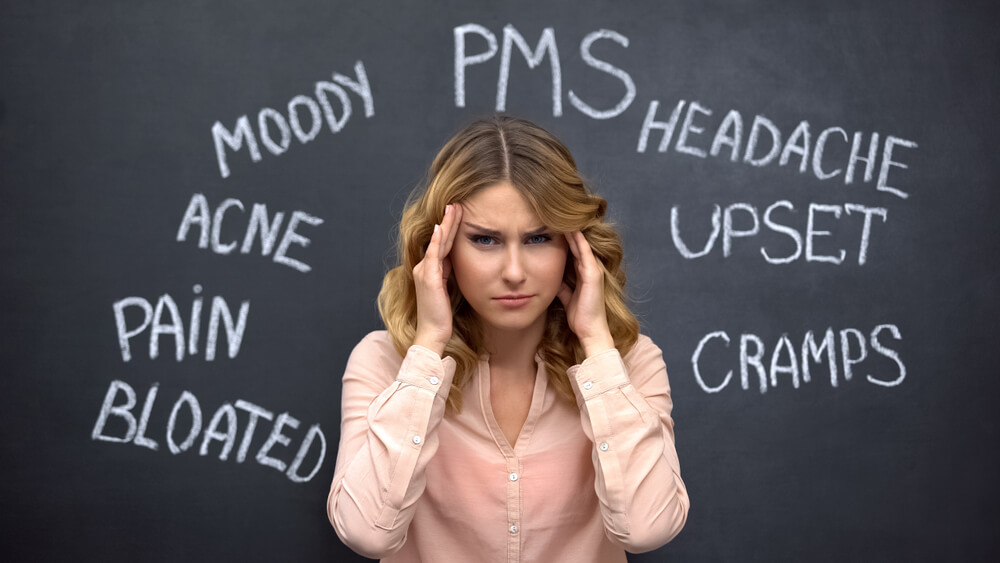Feeling bloated, irritable, fatigued, or unproductive each month? If any of these symptoms appear regularly around the time of your period, it is no coincidence. It is estimated that 90% of women experience premenstrual symptoms before their period each month. Symptoms can vary in severity, from bloating and fatigue to mood swings, causing premenstrual syndrome, or PMS, to look different for each woman.
At South Miami OB-GYN Associates, we want to provide you with the information you need to make the best decisions for your body. If PMS symptoms impact the quality of your life, schedule an appointment with our obstetricians in South Miami or Downtown Doral today.
What is Premenstrual Syndrome (PMS)?
Premenstrual syndrome (PMS) is a common condition that affects most women in the days or weeks leading up to their menstrual period. PMS is characterized by a wide range of physical, emotional, and behavioral symptoms that typically occur in a cyclical pattern. Mood swings, irritability, fatigue, bloating, breast tenderness, and headaches are some of the most common symptoms women experience.
The exact cause of PMS is not fully understood, but hormonal fluctuations during the menstrual cycle are thought to be the culprit. While most women experience some degree of PMS symptoms, some may experience more severe symptoms that significantly impact their daily lives. Various treatments available for PMS, ranging from lifestyle modifications to medications, can help alleviate symptoms and improve your quality of life.
Symptoms of Premenstrual Syndrome

The PMS symptoms before your period can vary widely from woman to woman. However, if you’re experiencing severe PMS symptoms or the symptoms affect your quality of life, it’s important to talk to your OB-GYN.
Common Physical Symptoms of PMS:
- Bloating
- Breast tenderness or swelling
- Fatigue
- Headaches or migraines
- Joint or muscle pain
- Weight gain
Common Emotional Symptoms of PMS:
- Anxiety or nervousness
- Depression or sadness
- Irritability or mood swings
- Increased stress
- Insomnia or difficulty sleeping
- Changes in sex drive
Common Behavioral Symptoms of PMS:
- Food cravings or changes in appetite
- Difficulty concentrating or remembering things
- Decreased productivity
- Social withdrawal or isolation
- Aggression or hostility
- Decreased interest in usual activities
Causes of Premenstrual Syndrome
Experts believe that PMS is caused by a decrease in levels of the hormones, estrogen, and progesterone, which occur during the second half of the menstrual cycle.
These hormonal changes can affect the levels of certain neurotransmitters in the brain, such as serotonin, which regulates mood, appetite, and sleep. It is thought that these
hormonal changes and altered neurotransmitter levels may contribute to PMS’s emotional and behavioral symptoms.
In addition to hormonal changes, other factors that may contribute to the development of PMS include:
- Genetic factors: PMS may have a genetic component, as it tends to run in families.
- Environmental factors: Certain environmental factors like stress may worsen PMS symptoms.
- Lifestyle factors: Poor diet, lack of exercise, and insufficient sleep may all contribute to the development and severity of PMS symptoms.
- Other medical conditions: Women with certain medical conditions, such as thyroid disorders or depression, may be more likely to experience PMS symptoms before their period.
What is Premenstrual Dysphoric Disorder?
Premenstrual dysphoric disorder (PMDD) is a more severe form of premenstrual syndrome that affects nearly 5% of women in the days or weeks leading up to their menstrual period. PMDD is characterized by intense emotional and behavioral symptoms that significantly interfere with a woman’s daily life.
The symptoms of premenstrual dysphoric disorder are like those of PMS but are more severe and may include:
Emotional symptoms:
- Extreme mood swings
- Feelings of sadness, hopelessness, or worthlessness
- Anxiety or tension
- Irritability or anger
- Increased sensitivity to rejection or criticism
- Panic attacks
Physical symptoms:
- Bloating
- Breast tenderness
- Headaches or migraines
- Fatigue or low energy
- Changes in appetite or food cravings
- Sleep disturbances
The exact cause of PMDD is not fully understood, but, like PMS, it is thought to be related to hormonal fluctuations during the menstrual cycle. Specifically, PMDD is believed to be caused by an abnormal response to changes in levels of the hormones, estrogen and progesterone, causing altered neurotransmitters in the brain.
It’s important to note that PMDD is a distinct clinical condition requiring a healthcare provider’s diagnosis. If you suspect you may have PMDD, talk to your OB-GYN to discuss treatment options. There are a variety of treatments available for PMDD, including medications and psychotherapy, that can help alleviate symptoms and improve your quality of life.
How to Reduce PMS Symptoms

If your symptoms before your period are interfering with your quality of life, it is time to contact your OB-GYN and explore the options.
Here are some strategies for how to reduce PMS symptoms:
- Maintaining a healthy lifestyle: Eating a balanced diet, regular exercise, and enough sleep can help reduce PMS symptoms. It is also important to avoid smoking and limit alcohol and caffeine consumption.
- Manage stress: Stress can exacerbate PMS symptoms, so finding ways to manage stress can be helpful. This may include practices such as meditation, deep breathing exercises, or yoga.
- Take over-the-counter medications: Over-the-counter medications such as ibuprofen or naproxen can help relieve physical symptoms such as cramps, headaches, and breast tenderness.
- Use hormonal birth control: Hormonal birth control methods, such as the pill or the patch, can help regulate hormonal fluctuations and reduce the severity of PMS symptoms in some women.
- Seek professional help: If your PMS symptoms are severe or interfere with your daily life, contact your OB-GYN at South Miami OB-GYN Associates
When to Visit South Miami OB-GYN Associates
If you are experiencing disruptive symptoms of PMS, schedule an appointment with one of our male or female board-certified OB-GYNs in either our South Miami or Downtown Doral offices.
One visit could change how you function every month. Schedule your appointment online or call 305.665.1133.
Disclaimer: The content provided in our blogs or linked materials is not intended and should not be construed as medical advice, nor is the information a substitute for professional medical expertise or treatment.



